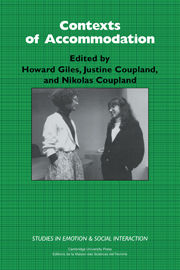Book contents
- Frontmatter
- Contents
- List of contributors
- 1 Accommodation theory: Communication, context, and consequence
- 2 Audience accommodation in the mass media
- 3 Accommodation on trial: Processes of communicative accommodation in courtroom interaction
- 4 Accommodation in medical consultations
- 5 Accommodation and mental disability
- 6 Accommodation in therapy
- 7 Accommodation in native-nonnative interactions: Going beyond the “what” to the “why” in second-language research
- 8 Interethnic accommodation: The role of norms
- 9 Organizational communication and accommodation: Toward some conceptual and empirical links
- Index
4 - Accommodation in medical consultations
Published online by Cambridge University Press: 18 March 2010
- Frontmatter
- Contents
- List of contributors
- 1 Accommodation theory: Communication, context, and consequence
- 2 Audience accommodation in the mass media
- 3 Accommodation on trial: Processes of communicative accommodation in courtroom interaction
- 4 Accommodation in medical consultations
- 5 Accommodation and mental disability
- 6 Accommodation in therapy
- 7 Accommodation in native-nonnative interactions: Going beyond the “what” to the “why” in second-language research
- 8 Interethnic accommodation: The role of norms
- 9 Organizational communication and accommodation: Toward some conceptual and empirical links
- Index
Summary
Introduction
During the past several decades, the role of interpersonal communication in health care contexts has been of great interest to medical practitioners and scholars. The communicative exchange between doctor and patient is fundamental to health care delivery for two reasons. First, although sophisticated technologies exist for diagnosis and treatment, talk between provider and patient still represents the primary means by which information is exchanged and understanding is achieved (Shuy 1976; Wasserman and Inui 1983). Second, the affective component of the doctor-patient relationship (e.g., the doctor's display of concern and interest in the patient, and the patient's involvement in the interaction) emerges communicatively through the manner in which doctors and patients coordinate their verbal and nonverbal responses (DiMatteo 1979). Research has demonstrated that informational and affective dimensions of doctor-patient interaction influence an array of health care outcomes including patients' satisfaction, understanding, compliance with prescribed regimens, and utilization of health care services (Ben-Sira 1980; Pendleton 1983).
In spite of its importance, the process of communicating in medical consultations remains largely unexplicated. The purpose of this chapter is to (1) critique extant theory and research on doctor-patient communication, (2) present a perspective, communication accommodation theory, for examining doctor-patient interaction, (3) discuss communicative processes and outcomes associated with doctor-patient encounters, and (4) suggest avenues for future research.
A critique of theory and research on doctor-patient communication
Although making significant contributions to understanding the communicative dynamics of medical interactions, previous research on doctor–patient interaction suffers from several limitations.
- Type
- Chapter
- Information
- Contexts of AccommodationDevelopments in Applied Sociolinguistics, pp. 131 - 156Publisher: Cambridge University PressPrint publication year: 1991
- 36
- Cited by



